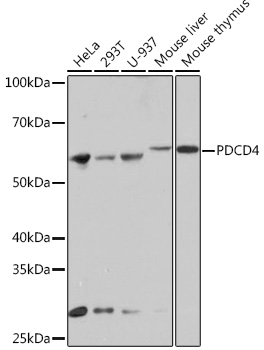Anti-PDCD4 Antibody (CAB9068)
- SKU:
- CAB9068
- Product type:
- Antibody
- Reactivity:
- Human
- Mouse
- Rat
- Host Species:
- Rabbit
- Isotype:
- IgG
- Antibody Type:
- Monoclonal Antibody
- Research Area:
- Cell Death
Frequently bought together:
Description
| Antibody Name: | Anti-PDCD4 Antibody |
| Antibody SKU: | CAB9068 |
| Antibody Size: | 20uL, 50uL, 100uL |
| Application: | WB IHC |
| Reactivity: | Human, Mouse, Rat |
| Host Species: | Rabbit |
| Immunogen: | A synthesized peptide derived from human PDCD4 |
| Application: | WB IHC |
| Recommended Dilution: | WB 1:500 - 1:2000 IHC 1:50 - 1:200 |
| Reactivity: | Human, Mouse, Rat |
| Positive Samples: | HeLa, 293T, U-937, Mouse liver, Mouse thymus |
| Immunogen: | A synthesized peptide derived from human PDCD4 |
| Purification Method: | Affinity purification |
| Storage Buffer: | Store at -20°C. Avoid freeze / thaw cycles. Buffer: PBS with 0.02% sodium azide, 0.05% BSA, 50% glycerol, pH7.3. |
| Isotype: | IgG |
| Sequence: | Email for sequence |
| Gene ID: | 27250 |
| Uniprot: | Q53EL6 |
| Cellular Location: | |
| Calculated MW: | 52kDa |
| Observed MW: | 52KDa |
| Synonyms: | H731 |
| Background: | This gene is a tumor suppressor and encodes a protein that binds to the eukaryotic translation initiation factor 4A1 and inhibits its function by preventing RNA binding. Alternative splicing results in multiple transcript variants. [provided by RefSeq, Dec 2010] |
| UniProt Protein Function: | PDCD4: protein localized to the nucleus in proliferating cells that seems to possess a tumor suppressor activity. Directly interacts with the RNA helicase eIF4A and inhibits protein synthesis by interfering with the assembly of the cap-dependent translation initiation complex. Suppresses carbonic anhydrase type II protein expression in carcinoid cell lines. Since tumor cells require a high bicarbonate flux for their growth, carbonic anhydrase suppression results in growth inhibition. Expression of this gene is modulated by cytokines in natural killer and T cells. The gene product is thought to play a role in apoptosis but the specific role has not yet been determined. Two differentially spliced isoforms have been identified. |
| UniProt Protein Details: | Protein type:Tumor suppressor; Apoptosis Chromosomal Location of Human Ortholog: 10q24 Cellular Component: cytoplasm; cytosol; nucleoplasm; nucleus Molecular Function:protein binding; RNA binding Biological Process: apoptosis; cell aging; negative regulation of apoptosis; negative regulation of cell cycle; negative regulation of JNK activity; negative regulation of transcription, DNA-dependent |
| NCBI Summary: | This gene is a tumor suppressor and encodes a protein that binds to the eukaryotic translation initiation factor 4A1 and inhibits its function by preventing RNA binding. Alternative splicing results in multiple transcript variants. [provided by RefSeq, Dec 2010] |
| UniProt Code: | Q53EL6 |
| NCBI GenInfo Identifier: | 317373317 |
| NCBI Gene ID: | 27250 |
| NCBI Accession: | Q53EL6.2 |
| UniProt Secondary Accession: | Q53EL6,O15501, Q5VZS6, Q6PJI5, Q8TAR5, Q99834, B2RCV4 B5ME91, |
| UniProt Related Accession: | Q53EL6 |
| Molecular Weight: | 50,576 Da |
| NCBI Full Name: | Programmed cell death protein 4 |
| NCBI Synonym Full Names: | programmed cell death 4 (neoplastic transformation inhibitor) |
| NCBI Official Symbol: | PDCD4 |
| NCBI Official Synonym Symbols: | H731 |
| NCBI Protein Information: | programmed cell death protein 4 |
| UniProt Protein Name: | Programmed cell death protein 4 |
| UniProt Synonym Protein Names: | Neoplastic transformation inhibitor protein; Nuclear antigen H731-like; Protein 197/15a |
| Protein Family: | Programmed cell death protein |
| UniProt Gene Name: | PDCD4 |
| UniProt Entry Name: | PDCD4_HUMAN |




![Anti-PDCD4 Antibody (CAB2570)[KO Validated] Anti-PDCD4 Antibody (CAB2570)[KO Validated]](https://cdn11.bigcommerce.com/s-39x6lpnvxv/images/stencil/590x590/products/32412/30601/anti-pdcd4-antibody-cab2570ko-validated__16764__42747.1644317669.jpg?c=1)